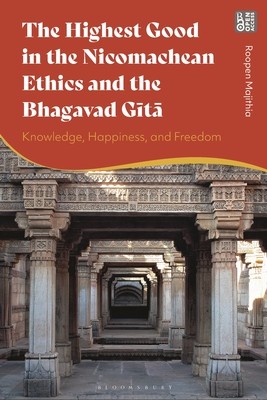
- We will send in 10–14 business days.
- Author: Roopen Majithia
- Publisher: Bloomsbury Academic
- ISBN-10: 1350215090
- ISBN-13: 9781350215092
- Format: 15.6 x 23.4 x 1.6 cm, kieti viršeliai
- Language: English
- SAVE -10% with code: EXTRA
The Highest Good in the Nicomachean Ethics & the Bhagavad Gita (e-book) (used book) | bookbook.eu
Reviews
Description
This open access book presents a comparative study of two classics of world literature, offering the first sustained study of what unites and divides the Nicomachean Ethics and the Bhagavad Gita.
Asking what the texts think is the nature of moral action and how it relates to the highest good, Roopen Majithia shows how the Gita stresses the objectivity of knowledge and freedom from being a subject, while the Ethics emphasizes the knower, working out Aristotle's central commitment to the idea of substance as the primary building block of the world. Yet both the Gita and the Ethics explain variety in human behaviour in terms of three driving forces. Both agree moral agency is a construct that is a function of background, education and habit, presupposing a cultural, political and economic infrastructure. What distinguishes the texts is how the content of right action is generated. Reading them together, alert to their individual accounts of how the practical relates to the reflective dimensions of life, Majithaia enriches our understanding of two cornerstone texts in the Greek and Indian philosophical traditions. The eBook editions of this book are available open access under a CC BY-NC-ND 3.0 licence on bloomsburycollections.com. Open access was funded by The Marjorie Young Bell Faculty Fund and The Hart Almerrin Massey Endowment.EXTRA 10 % discount with code: EXTRA
The promotion ends in 23d.20:17:36
The discount code is valid when purchasing from 10 €. Discounts do not stack.
- Author: Roopen Majithia
- Publisher: Bloomsbury Academic
- ISBN-10: 1350215090
- ISBN-13: 9781350215092
- Format: 15.6 x 23.4 x 1.6 cm, kieti viršeliai
- Language: English English
This open access book presents a comparative study of two classics of world literature, offering the first sustained study of what unites and divides the Nicomachean Ethics and the Bhagavad Gita.
Asking what the texts think is the nature of moral action and how it relates to the highest good, Roopen Majithia shows how the Gita stresses the objectivity of knowledge and freedom from being a subject, while the Ethics emphasizes the knower, working out Aristotle's central commitment to the idea of substance as the primary building block of the world. Yet both the Gita and the Ethics explain variety in human behaviour in terms of three driving forces. Both agree moral agency is a construct that is a function of background, education and habit, presupposing a cultural, political and economic infrastructure. What distinguishes the texts is how the content of right action is generated. Reading them together, alert to their individual accounts of how the practical relates to the reflective dimensions of life, Majithaia enriches our understanding of two cornerstone texts in the Greek and Indian philosophical traditions. The eBook editions of this book are available open access under a CC BY-NC-ND 3.0 licence on bloomsburycollections.com. Open access was funded by The Marjorie Young Bell Faculty Fund and The Hart Almerrin Massey Endowment.

Reviews